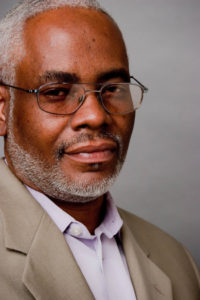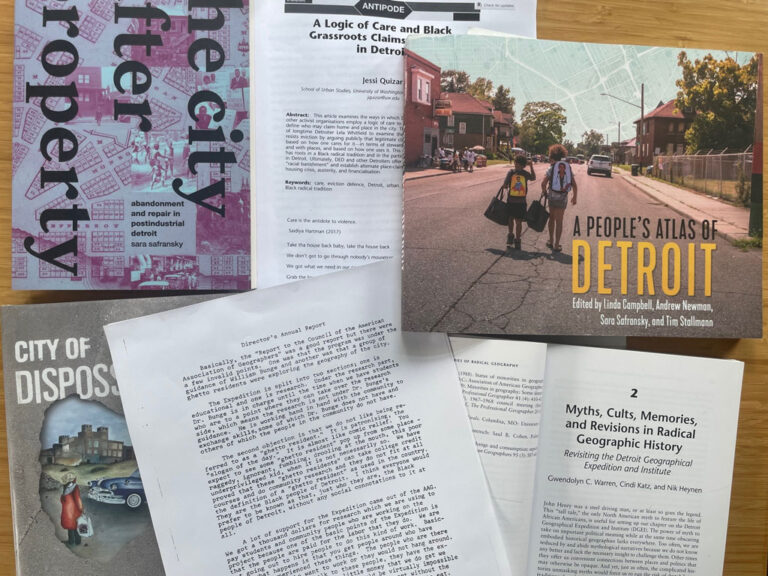AAG is Proud to Announce the 2022 AAG Honors
Each year, the AAG invites nominations for AAG Honors to be conferred in recognition of outstanding contributions to the advancement or welfare of the profession. The AAG Honors Committee is charged with making award recommendations for each category, with no more than two awards given in any one category. This year, the AAG Honors Committee and the AAG Council are pleased to announce the following AAG Honorees to be recognized during the 2022 AAG Annual Meeting.
2022 AAG Lifetime Achievement Honors
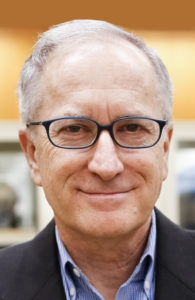
Douglas Richardson, Harvard University
The 2022 AAG Lifetime Achievement Honors is awarded to Dr. Douglas Richardson for his visionary and far-reaching contributions to the discipline. In 1980, he founded and led GeoResearch, Inc. which invented and patented a real-time, interactive GPS/GIS technology which enabled the continuous creation of accurate maps and their simultaneous integration with GIS. This was truly visionary given that this was developed was long before even cell phones were ubiquitous. Dr. Richardson’s work influenced the development of new horizons for research and applications of geography to transportation, public health, and the environmental sciences. From 2003 to 2019, Dr. Richardson served as the Executive Director of the AAG and brought the same visionary outlook to the organization. At the time of his appointment, the AAG was in a fragile position in terms of finances and membership. To address this, Doug Richardson renegotiated existing contracts, built external partnerships, garnered federal research grants, revamped AAG’s membership services, and took other actions to put AAG on sound financial footing. Dr. Richardson then successfully implemented a broad and inclusive vision for an AAG that has led to the expansion of the AAG’s membership to 12,000 members across nearly 100 countries. Three areas of particular impact were research, publications, and public policy.
Dr. Richardson strengthened the AAG’s capacity and infrastructure for obtaining external funding for geography-related research projects. He hired talented research staff and built productive collaborations between the AAG and academic geographers. As a result of his leadership, AAG received federal funding for a range of projects. For example, NIH provided funding for a project that brought GIScientists together with biomedical researchers to explore research frontiers at the intersection of geography and health research.
Another area of major contribution is publications. Under Dr. Richardson’s leadership, the AAG launched two new journals, GeoHumanities and the AAG Review of Books, bringing new audiences to geography. Another major project was the publication of the 15-volume International Encyclopedia of Geography, for which he still serves as Editor-in-Chief. Updated annually, it has become the most comprehensive and authoritative reference work on geography. The volume received the prestigious CHOICE Award for Outstanding Academic Title of 2017 by the Association of College and Research Libraries. Dr. Richardson is a prolific scholar who, since 2003, has co-authored or co-edited five other books (The Geographical Dimensions of Terrorism; Geography and Drug Abuse; GeoHumanities: Art, History and Text at the Edge of Place; Envisioning Landscapes, Making Worlds; and Space-Time Integration in Geography and GIScience), as well as dozens of articles and book chapters.
Dr. Richardson has also made a lasting impact in the area of public advocacy for geography. He created a Public Policy Research Program with dedicated staff to monitor congressional bills of relevance to the discipline and to lobby on behalf of geography. Thanks to this infrastructure, AAG was able to mobilize a strong response to threats to science/geoscience funding a few years ago, effect positive changes in federal and state K-12 geography education legislation and maintain strong and open federal GIS policies for geographers.
Taken together, Douglas Richardson has had a career of remarkable distinction during which his vision and dedication has place the AAG and the discipline of geography in a position of strength. He is eminently deserving of AAG’s Lifetime Achievement Honors.
The American Association of Geographers awards the AAG Lifetime Achievement Honors to Dr. Clyde Woods for his unique and path-breaking impact on the fields of Geography, Black Studies, Environmental Justice, Urban and Regional Planning, and Southern Studies. His scholarship, teaching, rigorous and “life-altering” mentoring, and visionary leadership reshaped fields well beyond academia. His work challenges the systematic exclusion of experiences of Black communities from geographical and social science scholarship while challenging the narrative that the violence and deprivations of racism and capitalism were inevitable or natural. Woods’ work transformed what was possible in Black geographical scholarship while laying a foundation to confront the crises made more acute over the past two decades — authoritarian populism, state and extra-legal racial violence, rising inequality, and environmental catastrophe.
In Development Arrested: The Blues and Plantation Power in the Mississippi Delta (1998), Woods discovered the “blues epistemology”—centering the complex systems of explanation and understanding developed by Black southerners within and in response to the plantation regime. Wood’s work carved a space and set an agenda for a geographical scholarship that diagnoses social injustice while centering sustainable and equitable geographies. Wood wrote other paradigm-shaping books and articles–including In the Wake of Hurricane Katrina, Black Geographies, and the Politics of Place (a collaboration with Katherine McKittrick). The posthumously published works Black California Dreamin’ and Development Drowned and Reborn signify the increasing uptake of his ideas by geographers over the past decade reflects his influence in expanding the scope and relevance of a field that he continues to shape through his scholarship and legacy.
Professor Woods’s work interwove scholarship, activism, and pedagogy. Wood’s activism challenged post-Katrina restoration plans and brought financial restitution to Katrina residents defrauded by Louisiana’s Road Home Program. This commitment to activism brought him in contact with various people in many different locations—both within and outside the university setting. While the college students he educated frequently became community organizers, Woods also engaged everyday people—barbers, unhoused people, community leaders, and children—as genuine thinkers and theorists of the world.
His pedagogical approach was student-centered, and he made time to work with and motivate students, individually and collectively, in his classes and through independent projects. Whether intentional or unintentional, the mentorship of scholars like Woods kept many Black students in the discipline of Geography. Before there was a space for Black Geographies at AAG meetings, Woods personally sat down with graduate students and junior scholars, inquiring about their projects while always offering honest feedback. Particularly for Black graduate students and junior scholars, Woods might be one of the few Black faces that they saw at large, primarily white AAG gatherings.
Since his death in 2011, Woods’s scholarship and legacy have only grown more influential, shaping the transformative subfield of Black Geographies, providing critical texts, methodologies, theoretical frameworks, and practices of community-engaged activism to reinforce his impact and life’s work and gifts to humanity.
For all these reasons, the AAG is proud to confer its inaugural, posthumous 2022 AAG Lifetime Achievement Honors upon Dr. Clyde Woods.
2022 AAG Distinguished Scholarship Honors
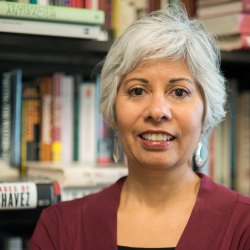 Laura Pulido, University of Oregon
Laura Pulido, University of Oregon
The 2022 AAG Distinguished Scholarship Award is awarded to Laura Pulido for her foundational and sustained contributions in environmental justice and Latinx geographies and to human geography more broadly. Pulido’s sustained works have been recognized with the AAG’s highest book awards for A People’s Guide to Los Angeles; Development Drowned and Reborn (by Clyde Woods, co-edited with Jordan T. Camp); and Black, Brown Yellow and Left: Radical activism in Los Angeles. Her foundational article on “Rethinking Environmental Racism: White privilege and urban development in Southern California” remains one of the most cited articles in the Annals of the AAG for its clear and accessible call to move from individuals to a structural understanding of environmental racism. Over three decades, she has published transformative work on social movements and racial capitalism and helped bring crucial interventions in the Black radical tradition into print. Her research has been funded by a wide range of agencies including the Ford, Woodrow Wilson and Guggenheim Foundations. One of the outstanding characteristics of her scholarship is her call for ethical scholar-activism and for scholars to build accountable relationships within and beyond the university. Laura has garnered numerous research grants and awards in support of her research, including from the National Science Foundation, the Antipode Foundation Scholar Activist Fund, and numerous university awards. Pulido’s scholarship has gone beyond simply contributing to human geographic scholarship, instead she has helped to transform human geography by developing new ways to study the intersections among urban political ecology, critical studies of race, and social movements.
Dr. Pulido’s influence is marked not only by her published works, but also by her sustained mentoring focused on first generation scholars and scholars of color. She has an unbroken record of service for over 20 years on the editorial board of the Annals of the American Association of Geographers, in addition to serving on the boards of 10 other academic journals and book series editor. Her article in The Professional Geographer, “Reflections on a white discipline,” pointed to the need for anti-racism work in the discipline of geography. Pulido has worked tirelessly to help the discipline of geography meet this challenge through her generous mentorship of students of color and serving as a foundational influence for the Latinx Geographies Specialty Group and Antipode’s Institute for the Geographies of Justice. We honor Dr. Pulido for her consistent contributions toward ethical practice and environmental justice in the discipline of geography.
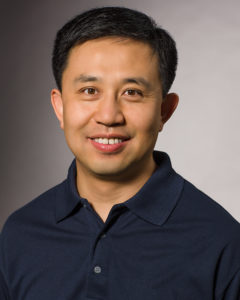
Shaowen Wang, University of Illinois at Urbana Champaign
Shaowen Wang, a 2022 recipient of the AAG’s Distinguished Scholarship Honors, has played a leading role in the development of cyber-based geographic information science (cyberGIS) as a transdisciplinary scientific approach that develops and integrates new computational methods, techniques, and instruments with geospatial knowledge, spatial analytics, and their applications in a broad range of research domains. Wang’s research has bridged a broad range of topics ranging from software enhancements to analyses of fundamental differences between serial and parallel computational architectures when addressing geospatial problems. Wang and his collaborators have disseminated their findings and insights through more than 160 peer-reviewed works.
Wang has a played a pivotal role in bold initiatives that brought together researchers from multiple institutions in geography, geographic information science (GIScience), computer science, and myriad other fields. A hallmark of his work has been his role in forming and leading research teams from multiple institutions and diverse disciplines that have garnered external funding and produced successive waves of cyberGIS enhancements. Wang has been a principal investigator for more than $30,000,000 in awards, with industry support complemented by funding from a diverse range of U.S. government agencies, including the National Science Foundation (NSF), the Centers for Disease Control and Prevention, Department of Energy, Environmental Protection Agency, National Aeronautics and Space Administration, and National Institutes of Health.
Wang’s transdisciplinary community-building skills has been evident in numerous different endeavors. As founding director of the CyberGIS Center for Advanced Digital and Spatial Studies at the University of Illinois-Urbana-Champaign (UIUC), Wang oversaw projects that developed new software, research frameworks, and analytic approaches to address problems in hydrology, public health, agriculture, environmental sustainability, and other realms. Working with UIUC’s National Center for Supercomputing Applications, Wang spearheaded the development of the first supercomputer focused on geospatial computation. He led a broadly based effort to establish one of five new national institutes supported through NSF’s Harnessing the Data Revolution initiative.
This institute will create an integrative discovery environment for harnessing geospatial data to increase understanding of interconnected interactions across diverse socioeconomic-environmental systems in order to enhance community resilience and environmental sustainability.
Wang has always demonstrated a strong commitment to interconnections among service, research, and teaching. He partnered with the AAG and other organizations to conduct a series of summer schools focused on developing the next-generation workforce for advancing cyberGIS and geospatial data science. He created a fellowship program to advance covid-19 research and education through reproducible geospatial science. He has had great passion for and extensive experience in leading and contributing to initiatives and activities focused on enhancing justice, diversity, equity, and inclusion. His numerous research and education projects have engaged many scholars, students, and stakeholders with diverse and underrepresented backgrounds.
Because of his many significant accomplishments; his boundless energy, advocacy, and passion for GIScience and geography; and his remarkable ability to anticipate future needs and address them by building intellectual bridges and working across interdisciplinary boundaries, the American Association of Geographers awards Distinguished Scholarship Honors to Shaowen Wang.
2022 Gilbert Grosvenor Honors for Geographic Education
 Jerry T. Mitchell, University of South Carolina
Jerry T. Mitchell, University of South Carolina
The 2022 Gilbert Grosvenor Honors for Geographic Education is awarded to Dr. Jerry T. Mitchell for his exceptional service to the discipline of geography and unique contributions to the geographic education community. From 2004 to 2021, Dr. Mitchell served as the Coordinator of the South Carolina Geographic Alliance (SCGA). He has received more than $5 million in grants to support geographic education and has provided pre-service training, professional development, and geographic content lectures for more than 40,000 educators throughout South Carolina. Under Jerry’s direction, the South Carolina Geographic Alliance developed the highly publicized and successful Geofest conferences, held twice annually to bring together educators from across the state of South Carolina to learn and share innovations for teaching geography. Jerry was the lead author of the South Carolina Social Studies Academic Standards in Geography that reach more than 700,000 students taking geography in grades 3, 7, and 9. For his geographic education work in South Carolina, Dr. Mitchell also received the South Carolina Governor’s Award for Excellence in Scientific Awareness.
In 2018, Jerry received the National Council for Geographic Education (NCGE) President’s Award for Service, and he became the President of NCGE in 2020. As President of NCGE, he made a point of ensuring that the organization’s annual meeting, held in December 2020 in conjunction with the National Council for Social Studies, prominently addressed issue of race, place, and social justice in the meetings’ talks and keynote presentations. Jerry was also selected as a National Geographic Explorer in 2019 by the National Geographic Society. Dr. Mitchell served as the editor for the Journal of Geography from 2010-2019 where he oversaw the publication of nearly a decade of geography teacher resources and peer-reviewed research that helped to define contemporary geographic education.
Dr. Mitchell has shown a clear commitment to diversity and inclusion through his personal publications, his student advising, his outreach to teachers and students across the state of South Carolina, and in his media engagement. Over the past several years, Jerry has co-authored pieces in Journal of Geography, The Geography Teacher, and Social Education that assist teachers in developing and teaching lessons that advance critical understandings of diversity, equity, and inclusion. Jerry’s research has explored the connectivity between the Carolina Lowcountry and Africa through rice cultivation, and he has contributed to scholarship exploring the complex histories and geographies connecting hospitality and slavery and the role of social power and locational discrimination in naming streets for famed civil rights leader Martin Luther King. Through his coauthored research on the segregation era travel guide The Negro Motorist Green Book, Dr. Mitchell integrates geography and language arts to help educators and their students explore the racial politics of African American mobility, highlighting the resistant agency that Black travelers exercised in planning trips to navigate racially hostile highways and accommodations. For his many contributions to geographic education and beyond, the AAG awards Dr. Jerry T. Mitchell with this year’s Gilbert Grosvenor Honors for Geographic Education.
2022 AAG Gilbert White Distinguished Public Service Honors
 Craig Colten, Louisiana State University
Craig Colten, Louisiana State University
Craig E. Colten receives the 2022 AAG Gilbert F. White Distinguished Public Service Honors for his many contributions while a government employee during his early career and, later, while an academic. After earning a 1984 PhD at Syracuse University under the mentorship of Donald W. Meinig, he applied his skill in historical geography at the Illinois Department of Natural Resources.
The Love Canal disaster of the 1970s had prompted state governments to identify historic industrial sites contaminated with toxic waste, and Colten led an interdisciplinary team to develop a hazardous waste information system, a pioneering application of GIS to primary sources such as Sanborn maps. During the early 1990s, his ongoing research on toxic environmental hazards supported Superfund litigation by the US Department of Justice. In 1996, however, he transitioned into an academic position at Texas State University, both as a faculty member in the Geography Department as well as the Director of the Center for Hazards and Environmental Geography.
Since 2000, as a professor in the Department of Geography and Anthropology at Louisiana State University, he has contributed seminal research on environmental racism and the environmental history of New Orleans, the Gulf Coast, and the Lower Mississippi River Valley. While the author of many publications that negotiate the borderlands of academic research and public policy, a series of monographs well captures his historical perspective on the shifting interface of water, land, and life along the Gulf Coast: An Unnatural Metropolis: Wresting New Orleans from Nature (2005), Perilous Place and Powerful Storms: Hurricane Protection in Coastal Louisiana (2009), Southern Waters: The Limits to Abundance (2014), and State of Disaster: A Historical Geography of Louisiana’s Land Loss Crisis (2021).
In the aftermath of Hurricane Katrina in 2005, as the public sought to understand the shocking devastation of one of America’s iconic cities, he demonstrated through his many media appearances and newspaper essays just how essential historical geography is for understanding people and places. Now emeritus, he and his many PhD graduates continue to apply their research to support communities threatened by flooding and coastal land loss. As one of his nomination letters puts it, “the highest art of an academic’s work is to be able to work within several worlds simultaneously and to directly provide voice for one’s ideas and knowledge in the halls of power and on the stage of public debate. It is a rare academic that can achieve this … highest bar of achievement that Gilbert White left for us. And it is [a] bar that Craig certainly passes at the highest level.”
2022 AAG Media Achievement Award
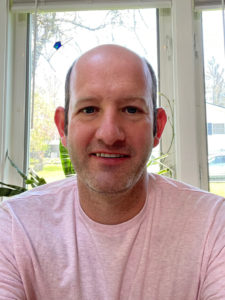
Joshua Inwood, Pennsylvania State University
Dr. Joshua Inwood is the recipient of the 2021 Media Achievement award for his distinguished record of achievement in media engagement on important topics that advance societal understanding of racism, civil rights, and social justice. Dr. Joshua Inwood currently holds a joint appointment as a Professor in the Department of Geography and the Rock Ethics Institute at Penn State University. He is also an affiliated faculty member in the African American Studies Program. Since earning his Ph.D. in 2007, Dr. Inwood has authored and co-authored more than 35 op-eds, including 8 articles with The Conversation that have attracted over half a million readers. Many of these contributions have been distributed or recirculated in prominent news outlets such as Newsweek, the Associated Press, the Huffington Post, and the Houston Chronicle. Additionally, Dr. Inwood has promoted the discipline of geography and articulated an anti-racist view on social issues through interviews with various local, national, and international print, television and radio media outlets, including USA Today, The Atlantic Magazine, PBS, The Christian Science Monitor, France24, and El Confidencial. In particular, Dr. Inwood’s research has been quoted in two Atlantic articles that advanced arguments in support of a truth commissions for confronting social and political issues such as the #MeToo movement and the January 6th capital riot. Throughout his career, Dr. Inwood has demonstrated and advocated for an ethos of public engagement among academics by leading initiatives within the AAG and through the Penn State Humanities Center to better prepare geographers and humanities researchers to engage with the media. Toward that end, Dr. Inwood has also consulted directly with the media to advance stronger connections between media and academics. Further, Dr Inwood, alongside Dr. Derek Aldermann, co-edited a special forum on public intellectualism in the AAG journal Professional Geographer, which argued for the need for media-savvy and community-engaged geographers. Dr. Inwood has authored over 50 peer-reviewed articles, book chapters, and book reviews with publications in leading journals such as the Annals of the American Association of Geographers and Geoforum. Dr. Inwood and his research group have secured multiple external grants to support his civil rights research, including two recent National Science Foundation (NSF) grants to evaluate a truth and reconciliation commission in Greensboro, NC, and to explore the use of geospatial intelligence
by civil rights organizations. Collectively, Dr. Inwood’s record of success with media engagement and scholarly research has garnered an international scholarly reputation for a commitment toward communicating counter-narratives to anti-justice and white supremacy movements. For these accomplishments, the AAG Honors Committee wholeheartedly supports his receipt of the AAG Media Achievement award.
 Sue Bergeron, Frank LaFone, Barbara MacLennan, and Jesse Rouse VerySpatial.com
Sue Bergeron, Frank LaFone, Barbara MacLennan, and Jesse Rouse VerySpatial.com
The 2022 AAG Media Achievement Award goes to VerySpatial and its four co-founders and hosts: Jesse Rouse (Instructor, Department of Geology and Geography, UNC Pembroke), Sue Bergeron (Associate Professor, Department of Politics and Geography, Coastal Carolina University), Frank LaFone (Senior Internet Applications Programmer, WV GIS Technical Center) and Barbara MacLennan (Assistant Professor, Department of Behavioral Sciences, Fairmont State University). VerySpatial is an internationally known, award-winning podcast that has provided outstanding geographic content and teaching methods to geography enthusiasts and educators around the world for 15 years. VerySpatial was founded the same year as YouTube and before the first iPhone appeared, demonstrating the co-founders’ innovation in media achievement. Since then, the hosts have regularly produced topical podcasts appreciated by a loyal and dedicated worldwide following.
VerySpatial seeks to point out how Geography and geospatial technologies filter into our digital and daily lives. The content is a mix of academic issues, current commercial and industrial advances in Geospatial technologies, and contemporary events. This combination has been important in bringing together material from published academic works in the context of recent events and trends. In doing so, the podcast monitors the pulse of geographical events and geospatial advances and maintains a sense of excitement and enthusiasm for geography. The content has ranged from political geography, spatial statistics, spatial privacy, virtual reality, interviews with world-renowned geographers, and hundreds of other topics over the course of 500 hours of material spanning over 650 episodes. The website receives approximately 180,000 page views, 75,000 visits, and 14,500 new visitors per month from around the world.
VerySpatial has been recognized for its contributions to geographic education: ESRI awarded the podcast a Special Achievement in GIS award in 2007; National Geographic listed VerySpatial in their top education blogs for four years in a row; and iTunes rated the podcast in the top 5% of all K–12 podcasts. In 2020, the AAG Guide to GeoWeek Activities contained suggestions for participating in Geography Awareness Week including listening to VerySpatial. The AAG Media Achievement Award not only adds to this list of honors bestowed upon VerySpatial, but also demonstrates the gratefulness that the field of geography has for this group of people for dedicating the last fifteen years to making geography exciting and accessible to thousands of people around the world every week.
